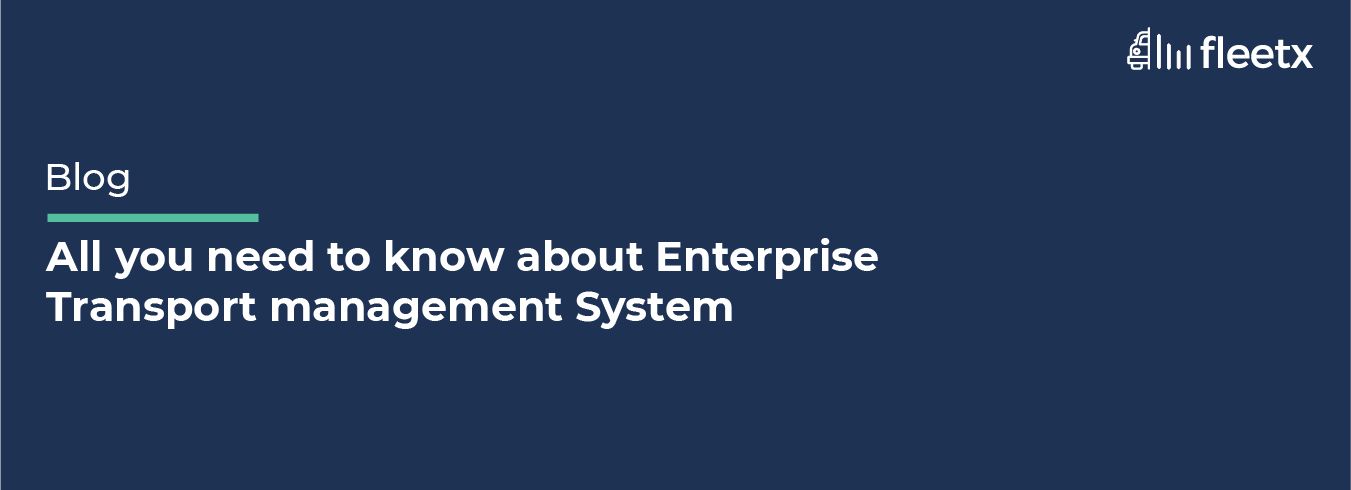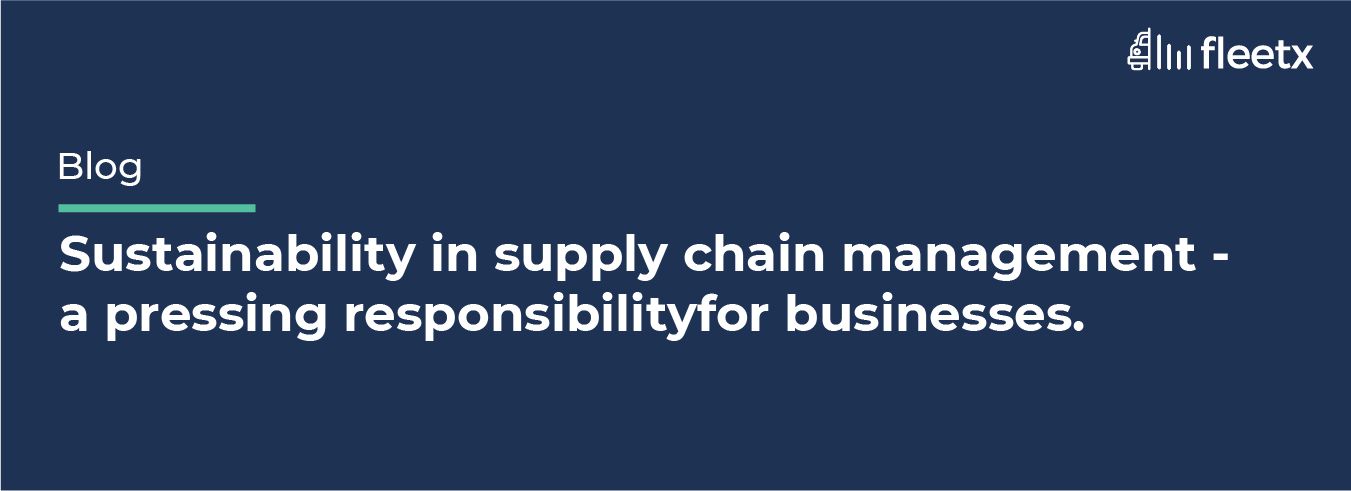
Transportation is one of the core processes in logistics & supply chain management, which is somewhat complex. The fragmentation of the production of goods has made manufacturing much more efficient. But, on the other hand, it has also increased the complexity of the supply chain operation, making logistics one of the most resource-heavy processes for companies. To efficiently manage and execute supply chain and transportation operations, companies across industries employ transport management systems to simplify and manage their logistics & transportation operation.
What is a Transport Management System or TMS?
A transport management system or TMS is an integral part of modern logistics and supply chain management specific to operations related to commercial transportation. In other words, an integrated transport management system or TMS is an essential tool that helps businesses plan, manage, optimize, and automate a lot of business processes related to transportation.
The primary goal of a TMS system is to improve operational efficiency for transport operations for businesses, particularly the ones transporting large volumes of goods. An ideal TMS system looks at both optimizing inbound logistics and outbound logistics for companies, evaluating and improving transportation management for both.
How is a Transport Management System (TMS) different from an ERP system?
A common misconception among businesses is that a TMS system is more or less similar to an Enterprise Resource Planning or ERP system, which is not the case. An ERP system is a much broader resource management solution used to integrate and centralize various business processes. It is primarily used to manage accounting, human resources, customer services, and much more. However, it doesn't offer a granular level management functionality specific to transportation and supply chains. As a result, businesses that ship large volumes of goods or have transportation and supply chains as their core business area do not find an ERP system very resourceful to their requirements.
On the other hand, a transport management system software offers functionalities and features specific to transportation and supply chain-related operations, which an ERP system lacks. As a result, various businesses opt to integrate a new TMS system into their existing ERP system. Such integration offers seamless technology-driven solutions to improve visibility, enhance automation, optimize better route planning, and offer data-driven insights into supply chain management and transportation operations, ergo, improving operational efficiency and cutting costs.
What kind of businesses use a Transport Management System?
As the name suggests, businesses that engage in shipping goods are the target consumers for TMS software. Companies across industries use freight management systems to streamline their supply chain management and offer transparency in the movement of goods from the manufacturer to last-mile delivery to business owners and their consumers. Some of the most common business types for using TMS software are,
Manufacturers
Manufacturers use TMS software to optimize both inbound and outbound logistics for their facilities. They require raw materials to be delivered to their facility and finished goods to be shipped out to warehouses regularly for further shipment to distributors. TMS logistics solutions help manufacturers streamline their supply chain with centralized planning and management of transport their supply chain operations.
Distributors
For most industries, goods shipped from manufacturers are sent to distributors across the business's region. Depending on the business structure, these distributors are responsible for receiving goods, warehousing, and packaging to the end consumer or retailers. The most common mode of transport for this is trucks. TMS software help distributors manage their supply chain concerning warehousing and dispatch.
Retailers
Supply chain management solutions like TMS software are more suited for large-scale businesses engaged in high shipments diversified across regions. However, with time and innovation, cloud-based transport management system software like fleetx has made it possible for small-scale companies and retailers to access and benefit from cloud-based TMS software in their supply chain and management too. For example, many TMS systems allow for contact management & real-time bidding, which helps retailers compare and choose the most efficient and cost-effective transporter based on their requirements.
E-commerce
The most efficient use of supply chain and transport management systems is carried out by e-commerce companies like Amazon or Flipkart that has revolutionized the commerce industry with innovative and tech-driven supply chain management. For example, Amazon (Read how Amazon logistics works here) has used tech-driven supply chain management software to manage and optimize inventory, warehousing & packaging, and last-time fulfillment and delivery.
As a result, they have achieved feats like same-day delivery across the country, lightning-fast fulfillment to customers. In addition to that, customers can track their ordered purchase right from purchasing to delivery. This has been made possible by transparency and efficient supply chain management by integrating TMS systems, fleet management solutions, and other tech-driven logistics solutions in their operation.
Third-Party Logistics Providers or Transporters
Transporters and logistics service providers such a 3PL logistics providers are on the rise as supply chain management becomes more tech-driven. Third-party logistics providers and transporters manage transportation and logistics for multiple clients and operating fleets of thousands of vehicles in the case of large transporters. Manual tracking and management of vehicles become a nightmare for fleet managers in such cases. Hence, transport management system software makes it possible for such transporters to track, manage, plan, and run their fleet from a single place. It is made possible by using a GPS tracking system using which TMS systems can help transporters,
- Track vehicles in their fleet in real-time
- Use historical fleet data for efficient route planning
- Offer Estimate delivery time and other customer-centric features
- Plan and execute fleet maintenance for all their vehicles
- Access data from their fleet through a single dashboard
- Get access to driver behavior & analytics for better driver management
TMS logistics solutions offer a wide range of features that apply to businesses across industries. These AI-driven features use big data and machine learning to provide top-off-the-shelf services and competitive prices without denting their budget.
What are the benefits of a Transport Management System for enterprises?
We have briefly looked at how TMS can help make specific business functions more efficient in the article. However, some TMS software offers services that show the true strength and benefits of tech-driven supply chain management. Let us look at some of the key offerings of enterprise transport management systems and help businesses improve operational efficiency.
Track Freight with Vehicle Tracking System
The most widely used and applicable benefit of a transport management system is the vehicle tracking system. TMS systems use GPS-based vehicle tracking technology to keep a tab on all active and standby vehicles in their fleet for more efficient management. The manual process of maintaining a track of vehicles is counter-productive and tough when fleet managers have to deal with hundreds of vehicles. Using TMS software, companies and fleet managers can,
- Track all the vehicles in real-time.
- Send assistance or help in case of accidents or any unintended events.
- Avoid malpractices and unwanted stops during trips by drivers.
- Offer real-time vehicle location to their customers, improving customer satisfaction.
- Get instant alert in case of delays, overspeeding, maintenance, critical issues, geofences.
TMS systems help companies and transporters improve fleet productivity & utilization, which reduces operational costs by more efficient use of resources and human capital.
Improved data-driven shipment and business insights
The most crucial USP for a transport management system software is its ability to collect data and insights from fleet operations and the movement of vehicles. This data can be interpreted using AI and state-of-the-art algorithms built into TMS software to provide meaningful business insights to the fleet manager based on vehicle and trip data. Fleet managers can access this data from the TMS software's dashboard. In addition to that, advanced TMS systems can generate reports and keep track of the documentation aspect of the operation including,
- Trip data for efficient route planning
- Invoice and challan generation
- e-way bill alerts
- Fuel consumption and statistics
- Driver behavior
Businesses can access all this data through the TMS system and create customized reports for either documentation or reporting purposes. Such insights make it easier to keep tracking of operations from both operational and compliance points of view.
Monitor driver behavior and prevent theft
Transport management solutions offer the fleet manager real-time alerts in case of route deviation or longer stoppage times. In addition, some of the best TMS software systems provide predictive analysis to suspect risky areas to prevent cargo and fuel thefts. Stoppage times tracked using geofence, and GPS systems help the plant logistics team plan their action instantaneously on the system-generated risky trips and avoid significant losses due to malpractices like cargo and fuel theft. Such advanced systems are beneficial for transporters or businesses that employ third-party vehicles or drivers on an ad-hoc basis to facilitate their transportations of goods.
Advanced technological capabilities and simplified process
Transport Management Systems can track shipment status, route progress with actual events, and real-time ETA & Delay alerts to fleet managers, which they can use to improve their customer service and operational transparency. Furthermore, electronic POD feature with option of putting Images, Comments & capture rejected quantity and reason to effectively manage disputes related to lost or damaged shipments with our transport management system.
In addition to this, Advanced TMS systems like Fleetx makes the process much more simplified and accessible. It comes with optimized & automatic supplier selection that make it possible to make more cost-effective and efficient business decisions. For example, it defines ratings of suppliers based on custom business rules helps shippers optimize dispatch planning & cost, keeping intact the complex SLAs such as Lane wise benchmarking and rate rationalization, schedule vs. Actual vehicle availability, etc.
In-plant management and fleet management
Many TMS systems offer enterprise in-plant logistics solutions to help businesses manage their fleet and vehicles in manufacturing facilities and plants. It includes the movement of trucks inside the plants and their TAT in real-time to prevent bottlenecks in truck movements inside the facility in loading, weighbridge, dispatch, and related areas. Transport Management Systems can offer such efficient solutions by automating a large chunk of operation and cutting down on irregularities by eliminating manual intervention.
Advanced TMS systems are integrated with existing ERP systems, which increases the visibility of key pre-dispatch activities like giving sales forecasting to the logistics team about the nature of the movement.
What are the key aspects of a Transport Management System?
Transport management systems help businesses plan, execute, and optimize the shipment of goods. Key aspects of a transport management system are as following
Role of TMS in route planning
Data-driven TMS systems allow businesses and fleet managers to improve route planning using data from previous trips and real-time traffic and road insights. It helps them strategically plan and choose the most optimal and efficient route from operational and cost perspectives.
Role of TMS in execution
TMS offers loading and dispatches tracking and optimization in addition to tracking, documentation, communication, and countless other features that make it possible to execute operations smoothly regularly. As a result, efficient transport operations saves businesses time and resources, bringing down their operational cost.
Role of TMS in optimization
TMS collects trip data from vehicles used to optimize the transportation process and helps businesses identify problems and bottlenecks in their operations and fix them promptly. Thus, it makes the role of data-driven optimization the most remarkable feature of TMS.
What are the challenges faced by businesses without a Transport Management System?
We have extensively talked about the benefits of transport management and how they make operations more efficient. In this section, we briefly look at the challenges faced by businesses without transport management systems.
Selecting the best carrier for shipment
Different goods require different kinds of handling. For example, time-sensitive goods like cold-storage items, vaccines, food items, vaccine supplies, etc., require specific handling and storage offered by shippers that specialize in such transportation solutions. Thus, businesses cannot rely on a single shipper or transporter to manage all kinds of shipments.
Choosing the right carrier for your shipment
As discussed above, choosing the right carrier for your shipment could be a tedious affair. When done manually, businesses often need to call various shippers and take quotes for their services based on the freight they want to be transported. Constantly reaching for inquiries, tracking & managing quotes, etc., is a time-consuming process. Businesses often invest a lot of time and resources in this activity, which is entirely counter-productive.
Tracking Shipments and Gathering Insights
If inquiring about available shippers wasn't time-consuming enough, manual tracking of shipments and gathering insights is a much more resource-intensive affair. Moreover, even if supply chain managers can gather data and get the status of the consignment manually, compiling such insights and keeping a tab on them in case of large fleets is riddled with inefficiencies and human error.
Choosing the best Transport Management System for your business
There are plenty of companies that offer enterprise transport management systems in India. However, to make the most out of TMS software or choosing the best TMS software requires a lot of considerations. Therefore, businesses need to evaluate their requirements carefully when selecting the best TMS system for their operation. References have also to be made based on,
- Scale of operation
- type of shipment
- operating cost
- mode of transportation
- area of operation
- volume of goods
- nature of goods
- scope of customization
These are specific things businesses need to consider when choosing the right transport management system for their business. Thankfully, technologically advanced and data-driven TMS software solutions by fleetx offer businesses space to evaluate their requirements based on all the parameters mentioned above and more. They allow companies to choose products and services based on their requirements and customize them according to their needs. Thus, such flexibility coupled with data & AI makes the enterprise transport management system by Fleetx one of the most advanced TMS software out there in the Indian market.
What is enterprise transportation?
The platform enables businesses to fully outsource their transportation needs, optimising logistical processes with custom technology and ensuring cost reductions across the board for transportation.
What are the four basic functions of transportation management?
Planning, Execution, Optimization, Freight Management, and Administration are the primary TMS tasks.



